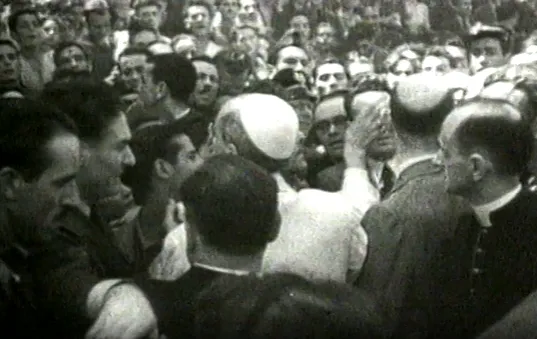
On July 19, 1943, Rome experienced a devastating attack when hundreds of Allied aircraft bombed the city for the first time. Nearly 600 American planes dropped over 4,000 bombs, totaling more than 1,000 tons, causing extensive destruction and claiming the lives of approximately 3,000 Romans. The primary targets were the San Lorenzo railway depot and the surrounding neighborhoods, including Tiburtino, Labicano, Prenestino, and Tuscolano. The attack occurred just days before the fall of fascism in Italy, and the monarchy, criticized for its failure to oppose Italy's entry into World War II, was losing favor among the population.
During this tragic event, a remarkable figure emerged as a source of comfort, aid, and hope for the people of Rome. Pope Pius XII, also known as Eugenio Pacelli, decided to take action and provide solace to those affected by the bombings. Despite the imminent danger, the Pontiff ventured into the streets to offer his support, demonstrating his commitment to his fellow citizens.
Accompanied by Monsignor Giovanni Battista Montini, the future Pope Paul VI, who was canonized by Pope Francis in 2018, Pius XII made his way to the San Lorenzo neighborhood while the air raid was still in progress. From the windows of the Vatican, the Holy Father witnessed the approaching planes and recognized the gravity of the situation. It was on this day that Pius XII truly earned the title of "Defensor Civitatis" (Defender of the City), a distinction he would be recognized for later.
Italian historian Giulio Alfano reconstructed the events of that tragic day, drawing from testimonies provided by the late Cardinal Fiorenzo Angelini, who served in a local parish at the time, as well as the historian's own mother, Maria Rigi. Rigi vividly recalls the horrific scenes: lifeless bodies strewn across the streets, bomb craters, death, and devastation. Not even the Pacelli family tomb in the cemetery was spared from the destruction caused by the bombs.
Despite the ongoing bombings and the risks involved, Pius XII approached the wounded, blessed the dead, and provided solace to the survivors. His white cassock, stained with the blood of the victims, served as a somber reminder of the tragedy that befell Rome. The Pontiff's spontaneous decision to be with his people, without the usual elaborate escort, demonstrated his empathy and pastoral care.
Pius XII's dedication to the people of Rome extended beyond this single instance. He remained a constant presence during the German occupation, defying Hitler's plans to abduct him as part of Operation Rabat. The Pope's commitment to the city earned him the title of "defensor civitatis," as he refused to leave Rome and willingly risked deportation to Germany.
In August of the same year, Rome was bombed once again. On this occasion, Pius XII visited the heavily affected area of San Giovanni to offer his support and prayers. His actions portrayed a shepherd who stood in solidarity with his flock, sharing their suffering and providing spiritual guidance during times of immense distress.
The heroic actions of Pope Pius XII did not go unnoticed. Cardinal Fiorenzo Angelini, who was present during the bombings, praised the Pope for his selflessness and emphasized that during wartime, all lives were precious and in need of saving. Pius XII went above and beyond, issuing orders to open convents, seminaries, and monasteries to provide shelter and protection for those affected by the conflict. His efforts to protect the vulnerable during World War II, including saving the lives of approximately 800,000 Jews, exemplified his commitment to upholding human dignity and fulfilling his duty as the leader of the Catholic Church.
Pope Francis sent a letter in 2013 to express his admiration for Pius XII's response to the tragedy. The Pope acknowledged that Pius XII, in those harrowing hours, stood among his fellow citizens who were deeply affected by the bombings. Through his actions, the Pontiff demonstrated himself as a caring shepherd, ready to share the burdens and suffering of his people, particularly during their most trying moments.







